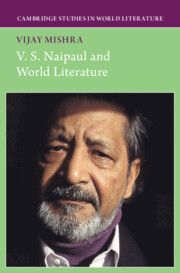Book contents
- V. S. Naipaul and World Literature
- Cambridge Studies in World Literature
- V. S. Naipaul and World Literature
- Copyright page
- Dedication
- Contents
- Figures
- Acknowledgments
- Prologue
- Introduction
- Chapter 1 V. S. Naipaul Aesthetic Ideology and World Literature
- Chapter 2 “The English Language Was Mine; The Tradition Was Not”
- Chapter 3 The Indenture Social Imaginary
- Chapter 4 Empires, Slaves, Rebels, and Revolutions
- Chapter 5 In the Shadow of the Master
- Chapter 6 The Travel Book and Wounded Civilizations
- Epilogue
- Notes
- Works Cited and Select Bibliography
- Index
Chapter 6 - The Travel Book and Wounded Civilizations
Published online by Cambridge University Press: 01 February 2024
- V. S. Naipaul and World Literature
- Cambridge Studies in World Literature
- V. S. Naipaul and World Literature
- Copyright page
- Dedication
- Contents
- Figures
- Acknowledgments
- Prologue
- Introduction
- Chapter 1 V. S. Naipaul Aesthetic Ideology and World Literature
- Chapter 2 “The English Language Was Mine; The Tradition Was Not”
- Chapter 3 The Indenture Social Imaginary
- Chapter 4 Empires, Slaves, Rebels, and Revolutions
- Chapter 5 In the Shadow of the Master
- Chapter 6 The Travel Book and Wounded Civilizations
- Epilogue
- Notes
- Works Cited and Select Bibliography
- Index
Summary
Chapter 6 looks at Naipaul’s travel writings on India and on Islam. To Naipaul, the novel, the novel of the long twentieth century, no longer gets at “difficult social and human truth.” The novel, having lost its dynamism is no longer the correct or even legitimate form for the expression of the heightened, sensitive, and expansive human imagination. In its place, suggests Naipaul, the forms that will re-shape our ideas of the world, are “biography, art history, cultural history, perhaps even history.” The travel form, as a historical undertaking, however, cannot be simply a factual survey of an unfamiliar place; it must be about things seen and people met, with writing matching the experience to be transmitted. The turn away from the novel produced works that were original and challenging, even if, at the level of social anthropology, they may be seen as throwbacks to ethnographic narratives of imperialist writers like James Anthony Froude. A close reading of the travel books, however, shows the persistence of the ironic temper, without that proactive or politically determined piety which has been the hallmark of much contemporary ethnographic writing.
- Type
- Chapter
- Information
- V. S. Naipaul and World Literature , pp. 164 - 197Publisher: Cambridge University PressPrint publication year: 2024

